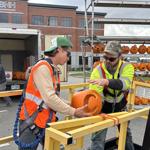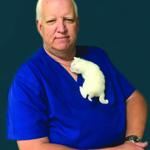LACONIA — Tests of the soil and groundwater on the property of the former Laconia State School have found very little evidence of contamination, and that which does exist can be easily removed, the panel which is working to develop the property has been told.
Robert Cheney, the vice-chairman of the Lakeshore Redevelopment Planning Commission, said the groundwater samples collected during the the 18-month study detected traces of contaminants which were “below regulatory standards.”
Soil samples taken from two spots showed that the concentration of contaminants is high enough that it will have to be removed, Cheney said. Lead and arsenic were found in one location, and lead and PCBs were found in another. In both cases, the tainted soil is close to the surface.
Cheney said the estimated cost of removing and properly disposing of the tainted soil is between $20,000 and $25,000.
That relatively few contaminants were found in the soil and groundwater is “a great sign,” Cheney said.
The cost of the survey was paid with federal funds, Cheney said. The full 600-page report will soon be posted on the commission’s website.
The former State School site is being eyed for possible residential, commercial, and agricultural development.
At its meeting on Monday, the commission voted to contract with RPF Environmental of Northwood to assess what hazardous materials might exist inside the 27 buildings on the 235-acre site. In particular, the scientists will be looking for the presence of lead paint, asbestos, mold, and PCBs, a banned substance considered to be a potential cause of cancer.
“We know that some of these four materials have been found in some of the buildings,” Cheney said, explaining that the discovery was made some years ago when certain buildings were being renovated.
The commission will allocate $104,400 from its budget to pay for the building assessment. That amount includes a contingency fund of $27,400 to cover any unanticipated expenses, Cheney explained.
The actual assessment work should start within 30 days and take two to three months to complete, Cheney said.
In other business, the commission voted to have the Lakes Region Planning Commission help prepare a grant application to be submitted to the Northern Borders Regional Commission, a federal-state partnership concerned with economic and community development in parts of New Hampshire, Maine, Vermont, and New York. The Planning Commission will be working with transportation planning firm VHB of Bedford in preparing the grant application. The deadline for submitting the application is May 1.
The commission is scheduled to hold its next meeting on Monday, March 9, at the Rist Frost Shumway building on Water Street.

















(0) comments
Welcome to the discussion.
Log In
Keep it Clean. Please avoid obscene, vulgar, lewd, racist or sexually-oriented language.
PLEASE TURN OFF YOUR CAPS LOCK.
Don't Threaten. Threats of harming another person will not be tolerated.
Be Truthful. Don't knowingly lie about anyone or anything.
Be Nice. No racism, sexism or any sort of -ism that is degrading to another person.
Be Proactive. Use the 'Report' link on each comment to let us know of abusive posts.
Share with Us. We'd love to hear eyewitness accounts, the history behind an article.